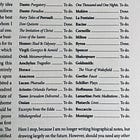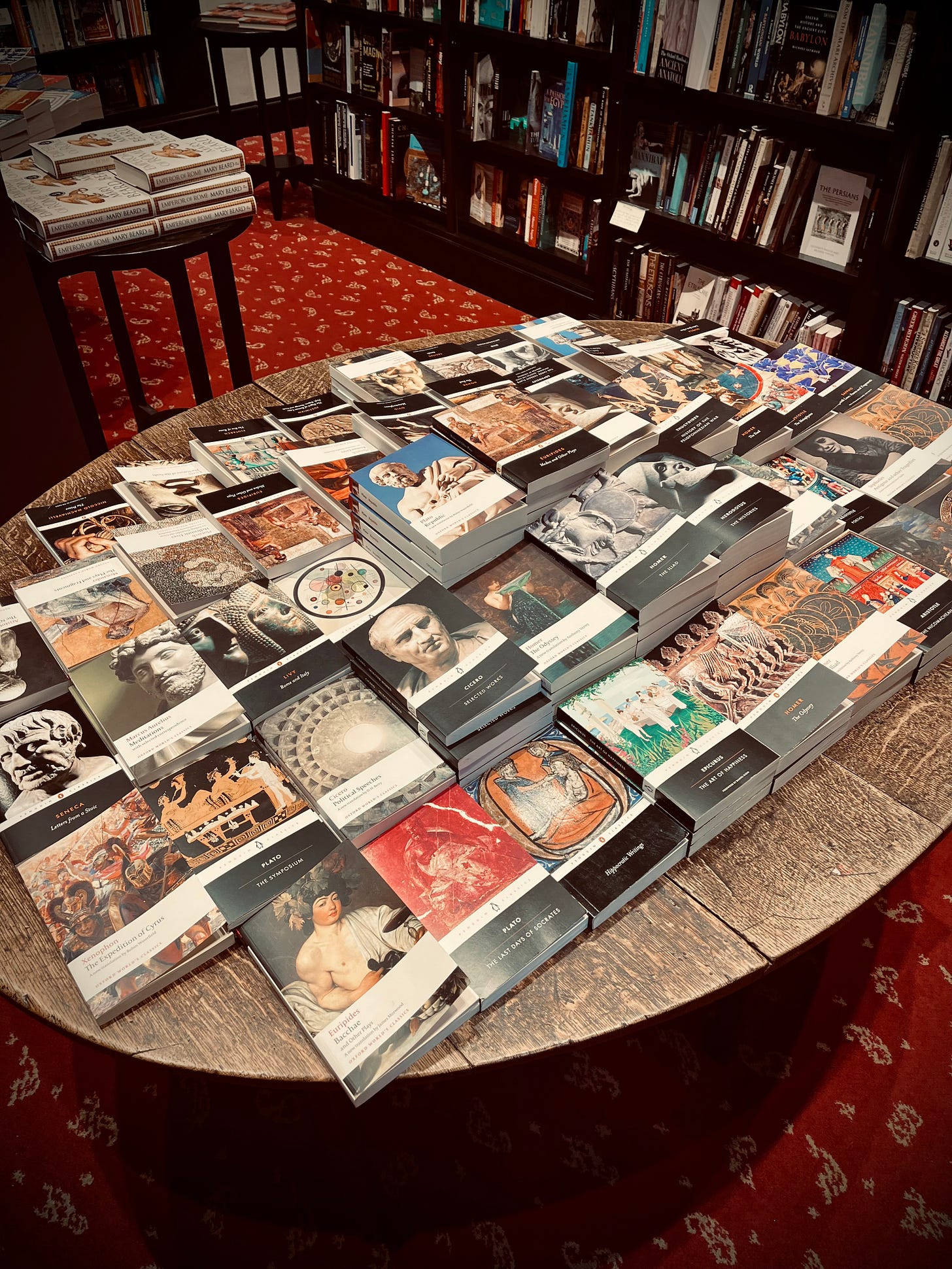Great Books Only: My Reading List for Next 10 Years (Part II: List Included)
Here's the list of books I am going to read one by one, year by year for the next two decades of my life.
The first part of this article 👇
‘Are we not likely to achieve our aim if we have a target?’ asked Aristotle in his handbook to a happy life - The Nicomachean Ethics. After all, if an archer does not know what his target is, he does not know where to aim.
The purpose of this list is to answer the following question: What is the target of my reading? What should I aim for?
The past two decades of my reading life resembled the life of a sailor who does not know which port he is sailing to. Despite its joys and toils, it was an exciting journey I have to confess. My ship moored at many wonderful islands: I spent two months with Hugo at his metaphorical island of Les Misérables; then two weeks with Emperor Hadrian at the island of Marguerite Yourcenar; I spent many days at Seneca’s library listening carefully to his advice.
As you can see ‘Much have I travell'd in the realms of gold, And many goodly states and kingdoms seen’ - as Keats wrote in his poem about Homer.
The problem is that my fast travels through the realms of gold had interrupted many important conversations I was having with those great minds. If only I had stayed a little bit longer with Dante, instead of jumping on my ship and sailing away from him, I might have understood The Divine Comedy a bit better than I do now. Only a day or two had passed after Homer finished telling his tale of Odysseus that I set my sails again.
Still, I don’t think that this hurry was a mistake. I believe that I was drawing a map of this amazing and fascinating world of books. I was moving fast because each great thinker pointed me toward another exciting island. Dante pointed me to Virgil, Virgil pointed me to Ovid; I was reading Seneca and he told me I should also consult Epicurus who lived on an island not far away.
Every traveller at some point in his journey realises how vast is the world in front of him. At some point, he realises that the farther he sails, the more his memory of the places he has been fades. This is when it becomes time to sail back, to visit familiar places to get to know them better.
As I look at the map that I have sketched over the years I notice that many places have not been drawn properly. The island of The Divine Comedy still has many Cantos to be explored; I have to come back to Hugo once again so he can finish showing me the inner chambers of our unconscious so I can add them to the map.
I am going to sail back with the aim of correcting my map by adding new areas to the places I have been, discovering new uncharted paths, and learning how to become a better sailor. This is the target I am aiming for.
I invite you to join this journey and become a crew member! All you need to do is to put in your application for the membership:
Below I include the islands we are going to sail to.
Great Books Only
The most important faculty a reader can have is humility. Humility to acknowledge how much they do not know, how much more a great book can offer to them if they have the humility to be able to tune their attention to it.
'The [type of attention] we choose to use to understand something determines what we find.’ writes Iain McGhilchrist in his seminal work Master & His Emissary. A great book is like an endless well from which you can draw new ideas, perspectives and emotions each time you change what you pay attention to.
The type of attention we are going to pay in the read-along that I am planning to start in January 2025 will be unusual. I am inspired by the French philosopher Pierre Hadot, who believed that ‘poems, novels, plays, paintings and sculptures, pieces of music, movies—insofar as they can all (at least potentially) contribute to the transformation of ourselves and our lives’1.
The lessons that can transform our lives Hadot calls - spiritual exercises. I will explore this idea of ‘spiritual exercises’ deeper in the next edition of my newsletter so you will have a clearer idea of what to expect, but in its essence I want us to read Dante’s The Divine Comedy (as an example) and ask, how can this masterpiece teach us how to live better.
We are going to go chapter by chapter, look at each character and theme and draw lessons from it. Allow me to elaborate on this idea more deeply in the next edition of my newsletter. In the meantime, if you are curious, I would recommend Pierre Hadot’s book on Goethe called Don’t Forget to Live.
Epics & Novels
The Divine Comedy by Dante Alighieri
Les Misérables by Victor Hugo
Aeneid by Virgil
Odyssey by Homer
Faust by Goethe
Memoirs of Hadrian by Marguerite Yourcenar
Metamorphoses by Ovid
Don Quixote by Miguel de Cervantes
Philosophy
On the Nature of Things by Lucretius
Confessions by St.Augustine
The Consolation of Philosophy by Boethius
The Enneads by Plotinus
Meditations by Marcus Aurelius
Everything by Seneca
Discourses of Epictetus
Essays by Michele de Montaigne
Emerson’s works by Ralph Waldo Emerson
Conversations with Goethe by J.P. Eckermann
History
The Peloponnesian War by Thucydides
Lives by Plutarch
Contemporary
Master & His Emissary by Iain McGhilchrist
Dominion by Tom Holland
The Rest is Noise by Alex Ross
Philosophy as a Way of Life by Pierre Hadot
A question for you:
Which books should we add to this list?
Proofread and edited by Lisa Statler.
Don’t Forget to Live by Pierre Hadot (from Preface)










Narekatsi is another world, Vashik, incredibly rich and enriching. The direction of your thought is interesting, who knows, maybe the Oxford professor can give you the right advice. But contact him, I would also be interested to know his opinion...
Thank you so much Vashik, you offer a wonderful selection.
Personally I would add
-Dostoevsky, "Notes from Underground", "Demons"
-Jonathan Swift - "Gulliver's Travels"
-Kierkegaard - "Fear and Trembling", "Either"
-Gilgamesh
-Mahabharata
-Narekatsi - Book of Lamentations
If poetry, then Baudelaire for sure...
... and yet many other masterpieces :)